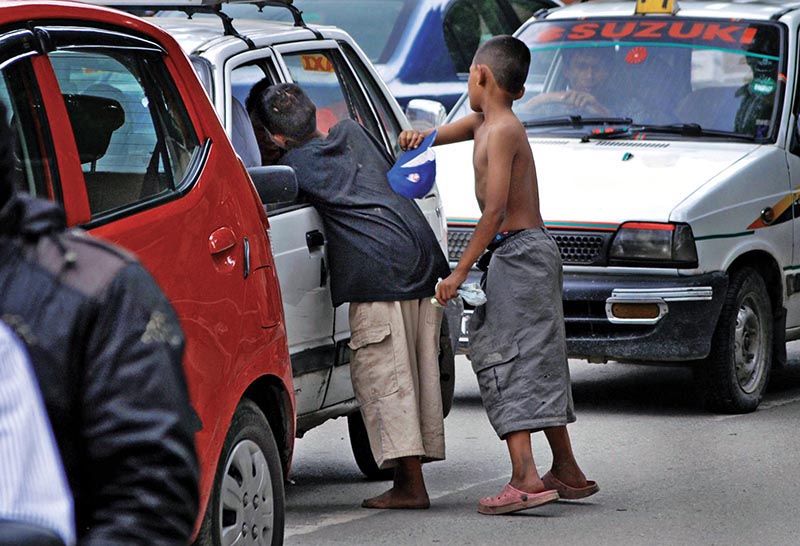Runaway kids choosing ‘freedom of streets’ over safety of foster homes
Kathmandu, November 20
Bikash (name changed), a resident of Balting, Kavrepalanchowk, fled home at the age of six after he could not ‘tolerate’ his drunken mother, who ‘belittled’ him by ‘yelling’ at him every now and then. The only person he could turn to at that time was his elder sister who was living with her husband in Samakhusi, Kathmandu. Before long he was in the capital.
“After a year, I could not tolerate my sister as well, because she was just like my mum, who’d scream at me all the time,” says Bikash, now 15. He then decided to run away. But this time he didn’t have anyone to turn to, as he had left his mother, and his father was working in Saudi Arabia.
Bikash had befriended five street children, who had also fled home, when he was staying with his sister. This “friendship” came to aid when he ended up in the streets, as they taught him how to adjust to the street life.
“Most of the children end up in the streets because of family circumstances,” says Chitra Paudel, programme assistant for street children at the Central Child Welfare Board. Children who live with single or step parents and those who are abused by alcoholic parents often run away from home, according to Paudel. “Poverty, drug addiction, lack of affection and peer pressure are other factors that force children to flee their homes,” says Paudel.
Children, like Bikash, who run away from home often meet with like-minded people of their age on the streets. Together they take up any odd job to feed themselves and fend off the bullies.
But street is a harsh place to live in and children cannot always defend themselves from everything. One such thing is drugs. Street children are often seen sniffing dendrite, which gradually turns them into drug addicts. They also start drinking alcohol and smoking cigarettes at a very early age.
Bikash, like many other street children, could not insulate himself from these harmful activities.
Today, he is undergoing treatment for drug addiction at Sover Recovery Drug and Alcohol Treatment and Rehabilitation Centre in Jorpati.
“Around 80 per cent of street children are addicted to drugs because they do not have anyone to counsel them,” says Paudel.
Nepal currently houses 533 foster homes to provide a new lease of life to street children and prevent them from falling into deadly traps, such as drug addiction. But the problem with many street children is that they look for ways to run away from foster homes or rehabilitation centre, as in the case of Bikash, because they love the freedom of the streets.
“Life in a rehab is boring. Street life is much better,” says Bikash, who was brought to the rehabilitation centre around three weeks ago. He has since tried to run away. “But there’s high security here,” he says. This is an indication that he could flee any time if he gets an opportunity.
Around 10 per cent of street children living in foster homes or rehabilitation centres run away, show the data of the Central Child Welfare Board. Around 873 street children have been rescued from the streets in the last two years, according to CCWB. Of them, 83 have run away, CCWB says.
But official data can be misleading because many foster homes do not report runaway cases. “As per our research, around 80 per cent of street children flee from foster homes because they love the street life,” said Bharat Adhikari, chief of child helpline of Child Workers in Nepal, an NGO.
As a result, foster homes are struggling to retain street children despite providing proper shelter, food and education. “Out of 100 street kids sheltered in our rehabilitation centre, 95 have been rescued more than once,” said Tshering Wangdu, executive director at Sover Recovery Drug and Alcohol Treatment and Rehabilitation Centre.
One of the reasons why street children run away from foster homes or rehabilitation centres is strict rules. Foster homes and rehabilitation centres try to maintain discipline, which street children find crippling, according to CCWB’s Paudel.
“Street children need good counselling for which we need skilled human resources. They also look for open space for entertainment and want to engage in creative activities, which require a lot of money,” said CWIN’s Adhikari. “None of the foster home, socialisation centre, and rehabilitation and drop-in centre in Nepal can provide those facilities as they are expensive.”






